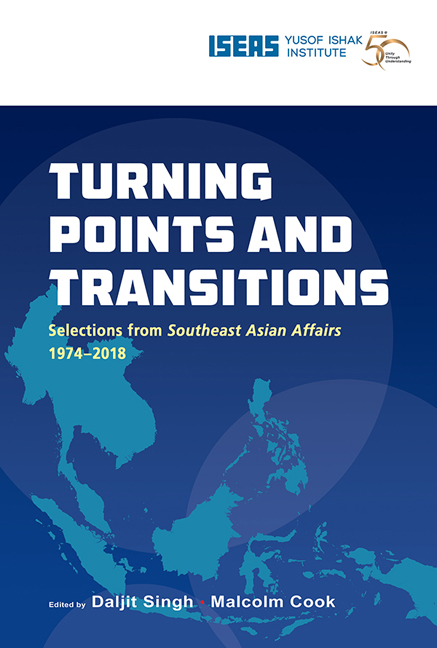Book contents
- Frontmatter
- Contents
- Message from the Director
- Foreword
- Foreword
- Introduction
- THE REGION
- BRUNEI
- CAMBODIA
- Cambodia and Regional Diplomacy (1982)
- Kampuchea 1979–81: National Rehabilitation in the Eye of an International Storm (1982)
- Cambodia 1991: Lasting Peace or Decent Interval? (1992)
- Hun Sen's Pre-emptive Coup: Causes and Consequences (1998)
- Cambodia in 2017: Plus ça change… (2018)
- INDONESIA
- LAOS
- MALAYSIA
- MYANMAR
- THE PHILIPPINES
- SINGAPORE
- THAILAND
- VIETNAM
Cambodia and Regional Diplomacy (1982)
from CAMBODIA
Published online by Cambridge University Press: 29 May 2019
- Frontmatter
- Contents
- Message from the Director
- Foreword
- Foreword
- Introduction
- THE REGION
- BRUNEI
- CAMBODIA
- Cambodia and Regional Diplomacy (1982)
- Kampuchea 1979–81: National Rehabilitation in the Eye of an International Storm (1982)
- Cambodia 1991: Lasting Peace or Decent Interval? (1992)
- Hun Sen's Pre-emptive Coup: Causes and Consequences (1998)
- Cambodia in 2017: Plus ça change… (2018)
- INDONESIA
- LAOS
- MALAYSIA
- MYANMAR
- THE PHILIPPINES
- SINGAPORE
- THAILAND
- VIETNAM
Summary
At bottom, resolution of the seemingly intractable Cambodian conflict depends on responses to a series of difficult politicomilitary questions:
(1) Is Vietnam's military control of Cambodia a harbinger of additional aggressive intent against Thailand, including possible annexation of the latter's sixteen northeastern provinces heavily populated by ethnic Lao? Worrisome is the fact that Hanoi's most stunning political successes since 1954 have been achieved through military victories, namely, the First and Second Indochina Wars and the more recent invasion of Cambodia and successful defence against China's 1979 border assault.
(2) Has the Soviet relationship to Vietnam embodied in the 1978 Friendship Treaty and actualized through Moscow's subsidation of both the Socialist Republic of Vietnam's (SRV) economy and occupation of Cambodia (and Laos) led to Hanoi's political subordination? Noteworthy in this regard is the regular use of Vietnamese air and naval bases by Soviet Pacific Fleet components as they steam from the Sea of Okhotsk through the South China Sea and Indian Ocean. While Vietnamese spokesmen insisted through 1979 that the Soviets had not received base rights, Hanoi has had virtually nothing to say on this subject for over a year.
(3) Is China's continued military aid to the Khmer Rouge (through Thailand) part of a policy to re-establish a Cambodian client state presumably after the Vietnamese are forced out? The maintenance of PRC military pressure on Vietnam's northern border combined with a growing Khmer Rouge guerrilla force of about 35,000 in western Cambodia appears calculated to “bleed” Vietnam and sap its ability to counter China's dominant position on the Asian mainland. On the other hand, Beijing's policy also serves to drive Hanoi into even closer security arrangements with the Soviet Union.
(4) How does the Sino-Soviet/Vietnam confrontation over Cambodia's future affect ASEAN's long-term hopes for a Zone of Peace, Freedom, and Neutrality (ZOPFAN) in Southeast Asia? Does China's de facto deterrent threat on Thailand's behalf threaten to split ASEAN's diplomatic unity over the region's preferred future, pitting those states which perceive Beijing to be the major long-term threat to stability (Malaysia and Indonesia) against those who fear a Soviet-Vietnamese entente (Singapore and Thailand)?
- Type
- Chapter
- Information
- Turning Points and TransitionsSelections from Southeast Asian Affairs 1974-2018, pp. 201 - 214Publisher: ISEAS–Yusof Ishak InstitutePrint publication year: 2018

